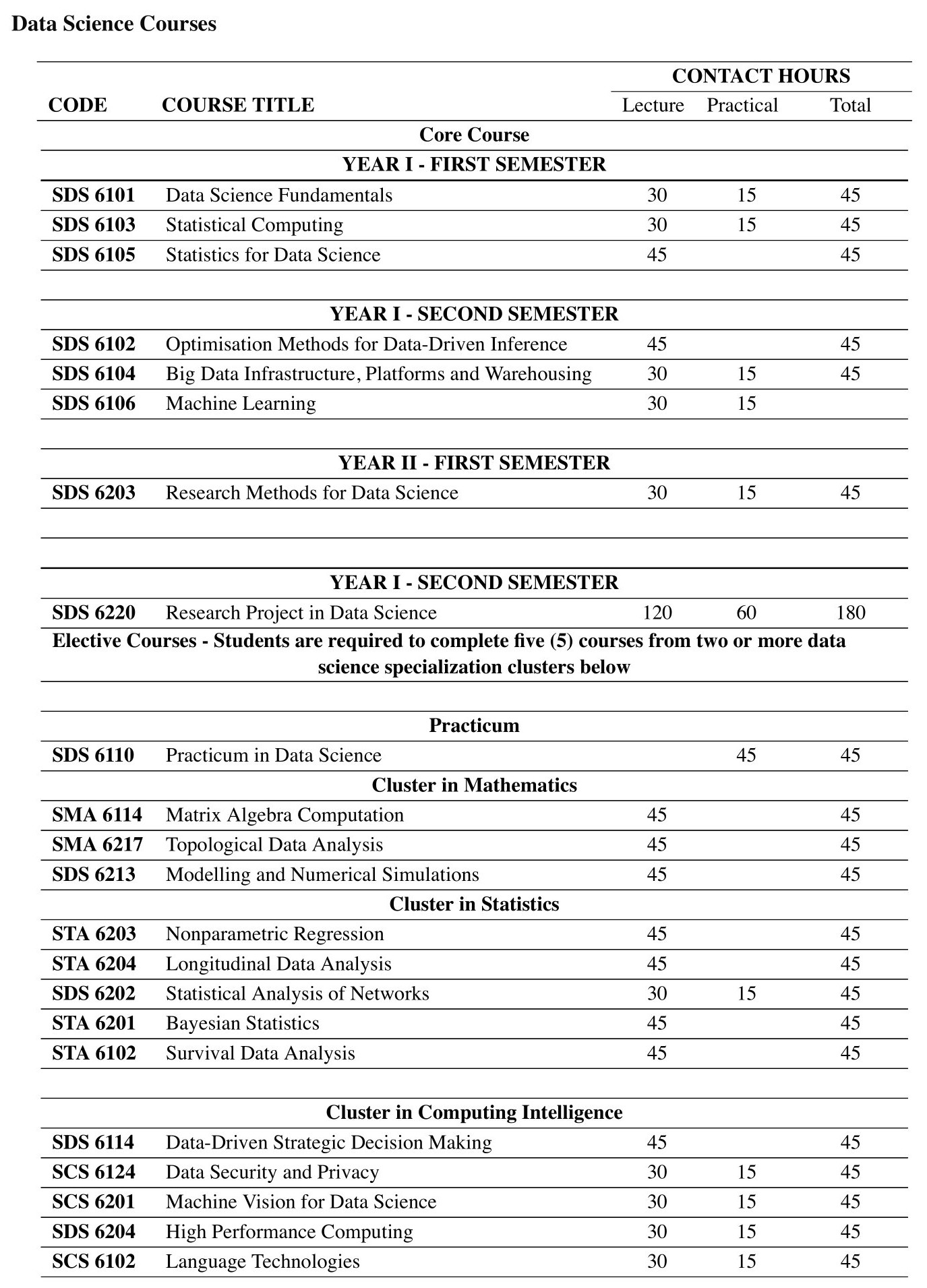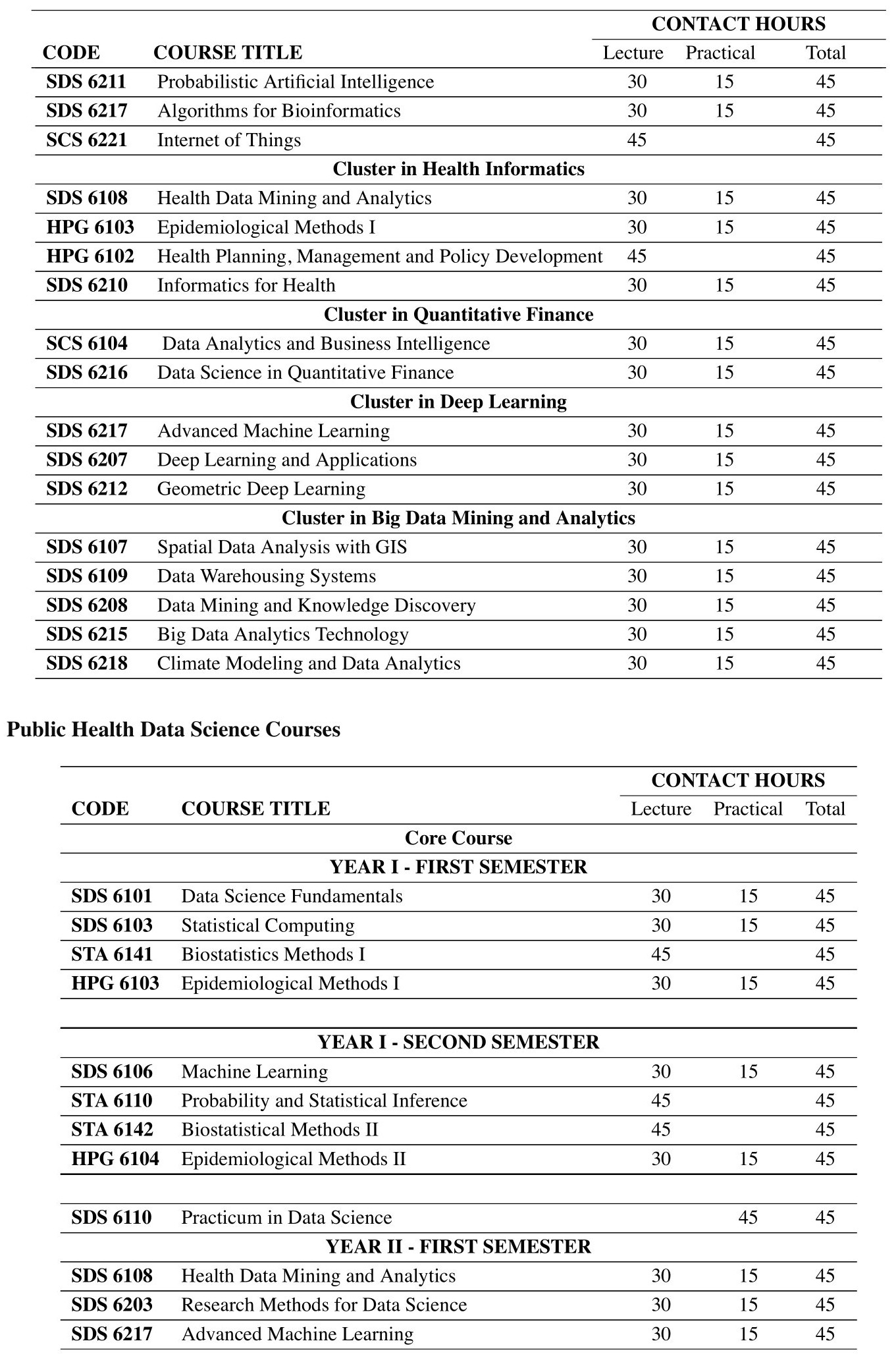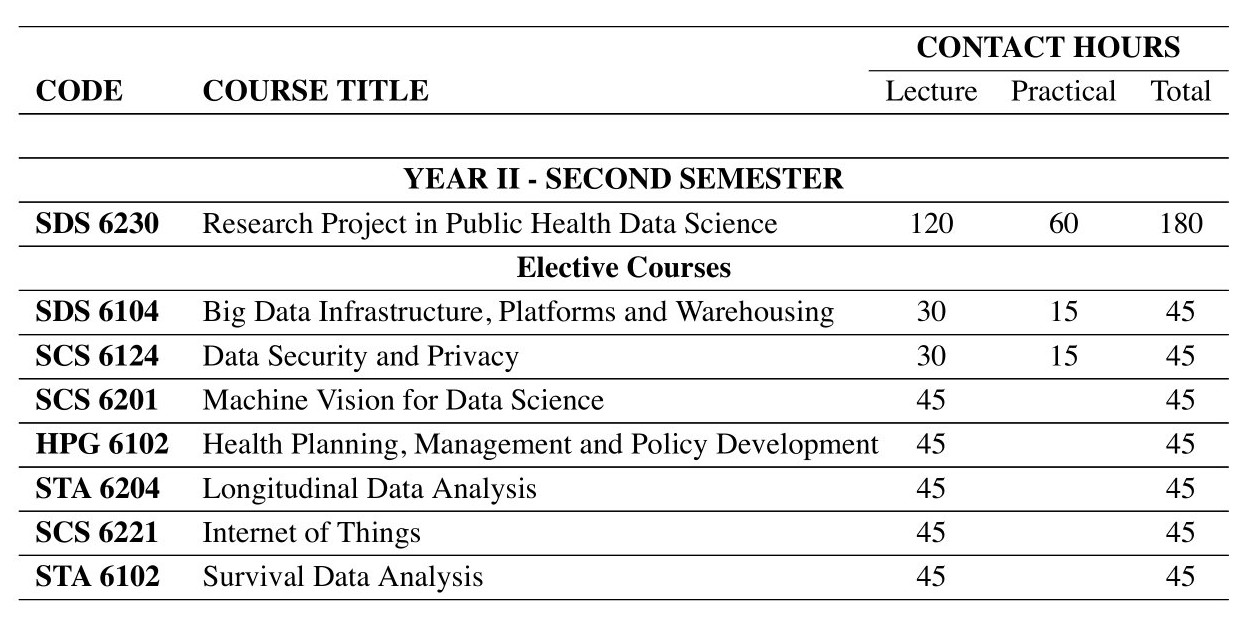Overview
Computers have fundamentally changed the way the world produces, manages, processes and analyses data. Today, we face a massive explosion in the amount of data generated and retained by organisations, the government, and even individuals like you and me. In this age of “big data”, the ability to analyse and process data has become a critical skill set. – data scientists make sense out of all this data and use it to make good business decisions. Data Science is a driving force of today’s information age.
The Master of Science in Data Science is an interdisciplinary graduate degree programme. It will provide students with a solid foundation in Data Science and computing skills in data analytics. This is achieved by integrating statistics, mathematics and computing, as well as machine learning and artificial intelligence. The programme offers upgrading opportunities for those who wish to equip themselves with Data Science and data analytic skills. It will also help to meet the growing demands for a big data workforce in all industries by transforming graduates in quantitative science into Data Science and analytics practitioners. Its applications are in many fields, including business, engineering, natural sciences, social sciences, humanities, and healthcare.
Developed with an understanding that organisations in virtually every industry need qualified professionals with the skills to transform big data into big insights and better decisions, the Master of Science in Data Science program will teach you how to clean, organise, analyse, and interpret unstructured data, deriving knowledge and communicating your discoveries clearly to stakeholders using sophisticated visualisation techniques and other means.
PHILOSOPHY OF THE PROGRAMME
The philosophy of the programme is to foster excellence in academic freedom, professionalism and integrity through quality scholarly teaching, training and research in Data Science. The programme is designed to be re responsive to national and international aspirations through creation, preservation, integration, transmission and utilisation of knowledge in Data Science and develop new innovations as a foundation for research, academia, managerial and policymakers in the field of Data Science. The programme is anchored on international and continental frameworks that address the sustainable development of data scientists as well as national development blueprints in African countries.
RATIONALE OF THE PROGRAMME
Organisations are increasingly depending on Data Science to solve current and emerging problems in sectors such as health, finance, education, agriculture, transport, security and business. Application areas include disease diagnosis, medical image analysis, bioinformatics, advanced image recognition, weather prediction, fraud and financial risk detection, speech recognition, and augmented reality. Organisations will therefore require professionals who can take the lead in selecting appropriate Data Science tools and models to apply to the specific situation of interest.
OBJECTIVES OF THE PROGRAMME
The goal of the programme is to develop data scientists equipped with appropriate knowledge, tools and techniques, skills and competence in critical thinking, problem analysis, problem-solving, and innovativeness required in decision-making based on data. These scientists should gain practical, hands-on experience with statistics programming languages and big data tools through coursework and applied research experiences while developing in depth understanding of the key technologies in Data Science and business analytics.
MODE OF DELIVERY
FACE-FACE MODE
This will be offered through lectures, seminars, discussions, tutorials, guided practical experiments and demonstrations
OPEN, DISTANCE LEARNING, AND E-LEARNING MODE
This will be offered off-campus using a multi-media approach, including a variety of self-instructional print and electronic study materials.
BLENDED LEARNING MODE
The blended learning (or hybrid learning) mode of delivery will combine face-to-face and online learning approaches by integrating technology and digital media with traditional instructor-led classroom activities.
SCHEDULE OF INTAKES:
The programme intake is in September of every year click the link below for more information on the application procedure University of Nairobi online Application Click this link to apply
Contacts
The Chairman,
Department of Mathematics.
P.O.Box 30197-00100
Telephone: 020 4914143 / 020 4914148
Email: maths@uonbi.ac.ke.
Structure
- The course shall extend over a minimum period of 4 semesters and a maximum period of 12 semesters.
- Each academic year shall have two semesters of 15 weeks each.
- For candidates enrolled in Data science option, students will be required to take a minimum of twelve (12) taught course units, which must include the eight (8) prescribed core units . The electives should be completed from courses from two or more data science specialization clusters including practicum course.
- Students enrolled in Public Health Data Science should take the twelve (12) prescribed core units including a Practicum. In addition, they must take a project.
- In addition, all candidates must take a research project.
- There will be eight (8) core course units, which shall be taken by all candidates.
- The project will be regarded as equivalent to four course units
- Students will be required to register for at least four course units per semester for the first three semesters and the 4th semester will be devoted to practical training and project.
- Candidates will be required to participate in weekly postgraduate seminars. The seminars will be of one-hour duration, and will cover special topics by means of lectures, tutorials and practical data analytics.
- Each taught course unit shall be defined as 45 hours of lectures, tutorials and practical data analysis.
- Practical Data Science will consist of a series of practical exercises allied to specific course units throughout the course. These shall be assessed as part of continuous assessment for the relevant course units.
- The student will need to be attached for a full term (semester) in a suitable
- research institute or organization. During the attachment the students will be expected to familiarize themselves with the application area, acquire skills in
- consulting, and do research and
- prepare a report for the project.



Admission Requirements
APPLICATION INFORMATION
Before continuing please read the University of Nairobi admission requirements Please ensure that you meet the admission requirements before applying. Online Student Application Manual
Online Application for Self-Sponsored Students
ADMISSION REQUIREMENTS
Common regulations for the Master of Science degree in the University of Nairobi and the Faculty of Science and Technology shall be applicable.
MINIMUM ADMISSION REQUIREMENTS
Holders of a Bachelor’s degree in Computer Science, Mathematics, Statistics, Engineering, Economics & Statistics, or Physics with at least Upper Second Class Honours, of the University of Nairobi, or an equivalent qualification from an institution recognized by the University of Nairobi senate.
Holders of a degree, recognised by the senate with at least Upper Second Class Honours in Earth & Climate Sciences, Education, Arts & Social Science, Public Health or any other related programme with proof of having covered an acceptable minimum number of mathematics or statistics course units will be evaluated individually by the Department of Mathematics Academic Committee.
Holders of a Lower Second Class Honours degree in Mathematics or Statistics, or an equivalent qualification from a university recognised by the senate, and additional relevant training or evidence of research or work experience may be considered for admission.
Postgraduate Diploma holders, provided that the applicant satisfies the minimum requirements for admission to a bachelor’s degree qualification level. The case will be evaluated individually by the Department of Mathematics Academic Committee.
Admission of international degree holders will be evaluated individually by the Department of Mathematics academic Committee.
3.2. REGULATIONS FOR CREDIT TRANSFERS
There shall be no credit transfer in the Master of Science in Data Science Programme.
Careers
Attachment Opportunities
Students can be attached but not limited to the following
- Non-governmental organizations
- Government parastatals and institutions
- Financial and non-financial institutions
- Manufacturing and service industries
- Any institution that handles data to make decisions
Career prospects /Opportunities
- Data scientist
- Data Analyst
- Machine Learning engineer
- Business Analyst
- Data Architect
- Data engineer
- Business intelligence and processes analyst
Fees and Funding
Exam Regulations
The Master of Science degree course in Data Science Examinations shall be governed by the common regulations of the University of Nairobi.
COURSE WORK EXAMINATION
Common University regulations for examination shall apply
- Master examinations shall be governed by the general regulations for the degree of master of science in the Faculty of Science and Technology.
- All courses units taken in a given semester shall normally be examined at the end of that semester.
- A candidate for the master of science shall be required to complete satisfactorily all such course work and assignment that may be required for the scheme of study.
- Each taught course unit shall be examined by a two hour written examination.
- Each course unit shall be graded independently out of 100 marks.
- The pass mark shall be 50%.
- The complete assessment of a taught course unit consists of continuous assessment tests, coursework or practical assignment and written examination. The contribution towards the unit aggregate score shall be 40% for course work and 60% for the written examination.
- The grading system of individual courses will be as above.
- A pass obtained after passing a supplementary exam shall be recorded as 50%.
- A candidate who
- has failed any course unit or its equivalent after three attempts or
- has failed to take any prescribed examination without good cause or
- fails to complete the programme within the maximum period shall, on the recommendation of the Committee of Examiners and approval by Senate, be discontinued from the programme.
